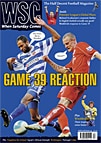 The Premier League feels once again the need for change. "Game 39" is the radical new idea
The Premier League feels once again the need for change. "Game 39" is the radical new idea
A new phrase entered football last month, one that we will be hearing a lot more of. The Premier League’s “Game 39” plan, involving an extra round of matches being played at five venues in other countries, met with almost universal derision when it was announced by chief executive Richard Scudamore in early February. The media and supporters’ groups condemned it straight away, and were soon followed by football officials from around the world. Even the FA, not known for taking an adversarial line with the Premier League, chanced some mild criticism of the plan once FIFA’s Sepp Blatter had dismissed it out of hand.
The last time that an announcement by one of the game’s officials generated so much scorn was a year ago, when Football League chairman Brian Mawhinney suggested that drawn matches might be decided by penalty shootouts. Part of Mawhinney’s justification for his witless idea, that “you have to change in a changing world or you get left behind”, was almost identical to something Scudamore said in defence of Game 39: “You can’t stand still in a changing world.” A sport that has maintained a format of teams playing home-and-away fixtures, which they win, lose or draw, every season since 1888 is once again declared to be in need of a fundamental, and completely unnecessary, overhaul.
It is simply not the case that the Premier League, taken as a whole, is popular around the world. Four English clubs have a major international fanbase, of varying sizes. This is because they have all but monopolised domestic trophies in the past decade, with history playing a part in some cases, too. The Big Four already fly around the world for lucrative friendlies – Man Utd even popped over to Saudi Arabia for two days in January – so they might be expected to be in favour of Game 39 and all that it entails. Indeed it has emerged that Peter Kenyon of Chelsea and Man Utd’s David Gill backed the idea when Scudamore consulted them, along with the chairmen of Bolton and Blackburn, before presenting the plan to the League’s other clubs.
But other than expats, hardly any “supporters” of English football outside the UK care about the clubs who aren’t winning things. Spurs may experience a surge in support among TV viewers overseas thanks to their Carling Cup victory, but it will subside again next season if they fail to build on that success. Scudamore’s recent suggestion, made in a meeting with supporters’ group the FSF, that Game 39 would enable “Reading, Bolton and the like the chance to ride on the big clubs and promote their brand” is abject nonsense. A lower mid-table team will not derive any benefit, beyond the TV appearance fee, from losing 3-0 to a Big Four club in a stadium packed with fans of the opposition.
Further threats to the integrity of the league will surely follow now that, as Scudamore put it, “we are in the middle of a consultation process which has had an interesting start”. The club chairmen who were in favour of Game 39 in private have since attempted to distance themselves from the blundering Scudamore, but you can be certain that they are keen to discuss other ideas, possibly with a different chief executive at the helm. You almost dread to think what may be coming, but expect to hear of “discussion documents” concerning play-offs to decide the title and relegation.
The increased franchising of English football may also exert an influence. Clubs continue to be bought up by billionaires. Vladimir Yevtushenkov, a “telecommunications tycoon” from Russia and the world’s 93rd richest man, is said to be behind a takeover of Sheffield Wednesday, which may go through before the end of March. Among the new group of owners at QPR is Lakshmi Mittal, one of the five richest people in the world, apparently worth twice as much as Roman Abramovich. Both these clubs are at least a year away from being promoted. But their owners, like the various tycoons behind clubs in the bottom half of the Premier League, would doubtless form a receptive audience for the suggestion that relegation is an outmoded concept and not something they should have to worry about any longer. Yet such a move carries obvious risks: how much less point there would be to watching, say, Middlesbrough v Reading if there was nothing at stake.
The advocates of New Football suggest that such changes are inevitable, ignoring the fact that none of them is. Lurking behind the promotion of these pointless innovations may be the desire to make a mark, or reinvent oneself: Mawhinney would cease to be most famous for being covered in paint by a protester when a Tory politician if he abolished the draw. Scudamore’s mishandling of the Carlos Tevez saga is back in the news, with Kia Joorabchian’s court case. With any luck, rather than distracting in a positive manner from his role in that fiasco, Game 39 will instead help towards Scudamore being handed a P45.
From WSC 254 April 2008